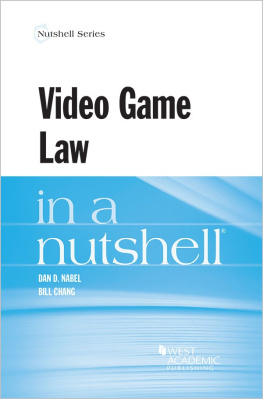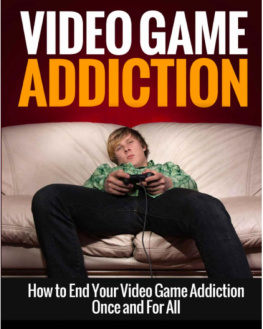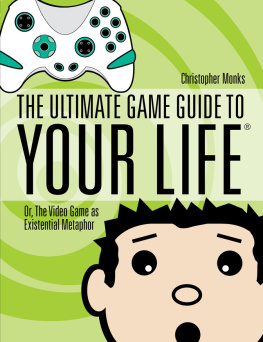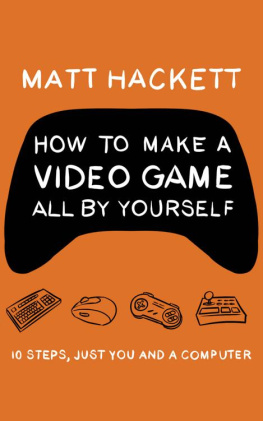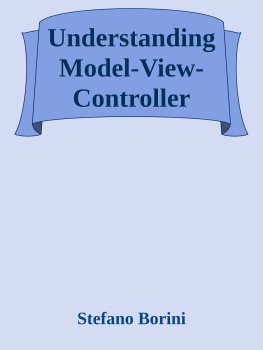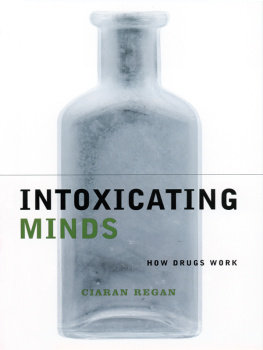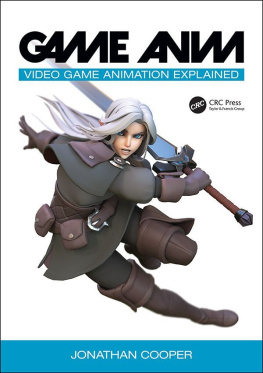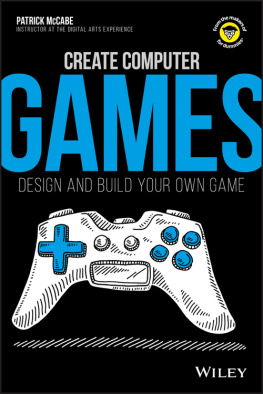Ciaran OConnor - Control the Controller: Understanding And Resolving Video Game Addiction
Here you can read online Ciaran OConnor - Control the Controller: Understanding And Resolving Video Game Addiction full text of the book (entire story) in english for free. Download pdf and epub, get meaning, cover and reviews about this ebook. year: 2014, publisher: Free Association Books, genre: Romance novel. Description of the work, (preface) as well as reviews are available. Best literature library LitArk.com created for fans of good reading and offers a wide selection of genres:
Romance novel
Science fiction
Adventure
Detective
Science
History
Home and family
Prose
Art
Politics
Computer
Non-fiction
Religion
Business
Children
Humor
Choose a favorite category and find really read worthwhile books. Enjoy immersion in the world of imagination, feel the emotions of the characters or learn something new for yourself, make an fascinating discovery.

- Book:Control the Controller: Understanding And Resolving Video Game Addiction
- Author:
- Publisher:Free Association Books
- Genre:
- Year:2014
- Rating:4 / 5
- Favourites:Add to favourites
- Your mark:
- 80
- 1
- 2
- 3
- 4
- 5
Control the Controller: Understanding And Resolving Video Game Addiction: summary, description and annotation
We offer to read an annotation, description, summary or preface (depends on what the author of the book "Control the Controller: Understanding And Resolving Video Game Addiction" wrote himself). If you haven't found the necessary information about the book — write in the comments, we will try to find it.
Ciaran OConnor: author's other books
Who wrote Control the Controller: Understanding And Resolving Video Game Addiction? Find out the surname, the name of the author of the book and a list of all author's works by series.
Control the Controller: Understanding And Resolving Video Game Addiction — read online for free the complete book (whole text) full work
Below is the text of the book, divided by pages. System saving the place of the last page read, allows you to conveniently read the book "Control the Controller: Understanding And Resolving Video Game Addiction" online for free, without having to search again every time where you left off. Put a bookmark, and you can go to the page where you finished reading at any time.
Font size:
Interval:
Bookmark:
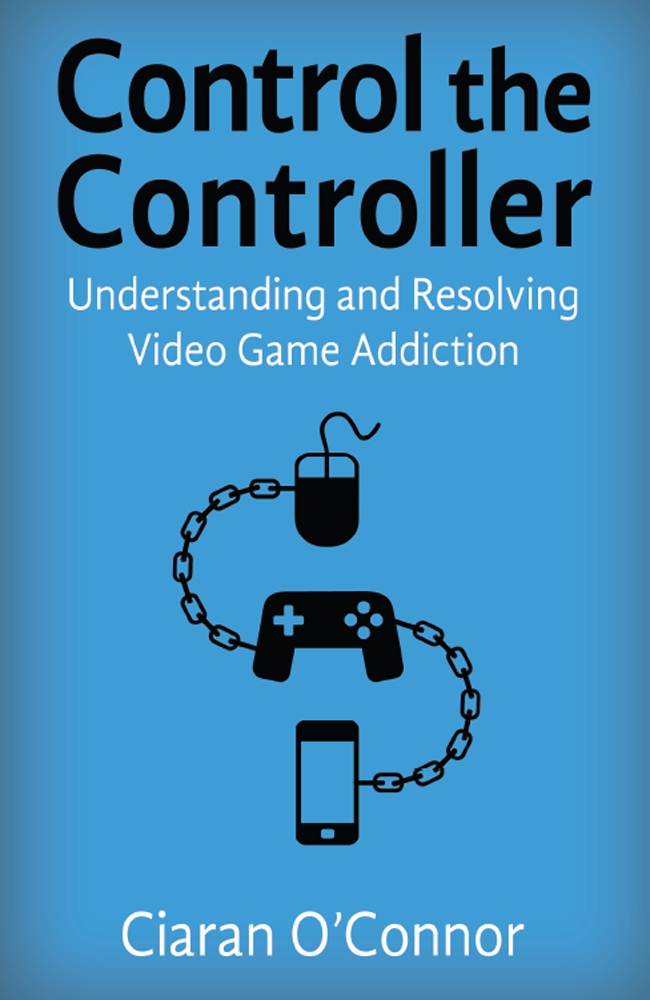
Control the
Controller
Understanding and Resolving
Video Game Addiction
By Ciaran OConnor UKCP, MA
First published in 2014 by
Free Publishing Limited
Copyright 2014 Free Publishing Limited
The authors rights are fully asserted. The right of Ciaran OConnor to be identified as the author of this work has been asserted by him in accordance with the Copyright, Designs and Patents Act 1988
A CIP Catalogue of this book is available from the British Library
ISBN: 978-1-85343-226-2
Epub ISBN 978-1-85343-224-8
Mobi ISBN 978-1-85343-232-3
All rights reserved; no part of this publication may be reproduced, stored in a retrieval system, or transmitted, in any form or by any means, electronic, mechanical, photocopying, recording or otherwise, without the prior written permission of the publisher. Nor be circulated in any form of binding or cover other than that in which it is published and a similar condition including this condition being imposed on the subsequent purchaser.
Typeset in Janson Text 11pt by
www.chandlerbookdesign.co.uk
Printed in Great Britain by
PrintonDemand-Worldwide
FOREWORD
Video Games and Addiction
Dr. Mark D. Griffiths
Director, International Gaming Research Unit, Psychology Division, Nottingham Trent University, United Kingdom, NG1 4BU
I was delighted to be asked by Ciaran OConnor to write the Foreword to his new book. As you will soon read, Ciaran had his own issues surrounding gaming addiction and has used his own personal experiences to help underpin his own psychological therapeutic interventions in the treatment of gaming addiction. Ciarans writing is heartfelt and personal. However, he has also attempted to integrate some of the academic and clinical literature to support his views. He wrote this book because he felt it needed to be written and he wanted others that have or treat (or want to treat) this problem to have a resource they could turn to.
For nearly 30 years I have been studying behavioural addictions (put simply, addictions that dont involve taking any drugs). In the mid-1980s I began my academic career by studying adolescents that were addicted to fruit machines in amusement arcades. It was through this work I began to notice teenagers that would spend all day in the arcade playing on the video game machines. In the early 1990s I began to publish academic papers on video game addiction and saw many similarities (both behaviourally and psychologically) between both playing video games and slot machines. By the mid-1990s, I began researching into internet addiction and in 1995 I published an academic paper simply entitled Technological Addictions in which I brought all these disparate behaviours (video game addiction, internet addiction, television addiction, slot machine addiction, etc.) under one conceptual umbrella. Since then, the field of technological addictions has expanded greatly particularly in the area of gaming addiction.
Gaming addiction has changed and evolved greatly since I first started researching in the area. In the 1980s, the focus was on arcade video game addiction. In the 1990s, the focus changed to home console video game addiction. Over the last decade, the focus has been online video game addiction particularly in relation to Massively Multiplayer Online Role Playing Games (such as World of Warcraft and Everquest). In the 1990s I researched separately into internet addiction and video game addiction but now they have become part of the same area of study.
Over the last 15 years, research into various online addictions has greatly increased. One of the most important consequences of the increased amount of research in this area is that in May 2013, Internet Gaming Disorder was officially recognized by the American Psychiatric Association as an area warranting further research and was included in the appendix of the fifth edition of the Diagnostic and Statistical Manual of Mental Disorders (more popularly known as the DSM-5).
Prior to the publication of the DSM-5 in 2013, there had been some debate as to whether internet addiction should be introduced into the text as a separate disorder. Alongside this, there has also been debate as to whether those researching in the online addiction field should be researching generalized internet use and/or the potentially addictive activities that can be engaged on the internet (e.g., gambling, video gaming, sex, shopping, etc.). Following these debates, the Substance Use Disorder Work Group (SUDWG) recommended that the DSM-5 include a sub-type of problematic internet use (i.e., internet gaming disorder [IGD]) in Section 3 (Emerging Measures and Models) as an area that needed future research before being included in future editions of the DSM.
According to leading scholars in the area, IGD will not be included as a separate mental disorder until the (i) defining features of IGD have been identified, (ii) reliability and validity of specific IGD criteria have been obtained cross-culturally, (iii) prevalence rates have been determined in representative epidemiological samples across the world, and (iv) etiology and associated biological features have been evaluated.
Although there is now a rapidly growing literature on pathological video gaming, one of the key reasons that IGD was not included in the main text of the DSM-5 was that that there are no standardized diagnostic criteria used to assess gaming addiction across the many studies that have been published. For instance, I (and some of my Australian colleagues) carried out a review of instruments that have been used to assess problematic, pathological and/or addictive gaming. We reported that 18 different screening instruments had been developed, and that these had been used in over 60 quantitative studies comprising nearly 60,000 participants.
The main strengths of these gaming addiction screens included: (i) the brevity and ease of scoring, (ii) excellent psychometric properties such as convergent validity and internal consistency, and (iii) robust data that will aid the development of standardized norms for adolescent populations. However, the main weaknesses identified in the instrumentation included: (i) core addiction indicators being inconsistent across studies, (ii) a general lack of any temporal dimension, (iii) inconsistent cut-off scores relating to clinical status, (iv) poor and/or inadequate inter-rater reliability and predictive validity, and (v) inconsistent and/or dimensionality.
Video gaming that is problematic, pathological and/or addictive lacks a widely accepted definition. I argued in a paper that I co-wrote with some of my Hungarian colleagues that some researchers consider video games as the starting point for examining the characteristics of this specific disorder, while others consider the internet as the main platform that unites different addictive internet activities, including online games. Recent studies have made an effort to integrate both approaches. Consequently, IGD can either be viewed as a specific type of video game addiction, or as a variant of internet addiction, or as an independent diagnosis.
Clinical interventions and treatment for problematic and/or addictive video game play vary considerably in the psychological and medical literature, with most of the very few published studies employing some type of cognitive-behavioural therapy (CBT), pharmacotherapy, and/or self-devised psychological interventions. Currently, the evidence based on the treatment of problematic and/or addictive gaming is limited. Furthermore, the lack of consistent approaches to treating problematic video game playing and video game addiction makes it difficult to produce any definitive conclusions as to the efficacy of treatment, although at this stage CBT (as with the treatment efficacy of other addictions) appears to show good preliminary support. There remains a need for controlled, comparative studies of psychological and pharmacological treatments, administered individually and in combination with each other, to determine the optimal treatment approach.
Font size:
Interval:
Bookmark:
Similar books «Control the Controller: Understanding And Resolving Video Game Addiction»
Look at similar books to Control the Controller: Understanding And Resolving Video Game Addiction. We have selected literature similar in name and meaning in the hope of providing readers with more options to find new, interesting, not yet read works.
Discussion, reviews of the book Control the Controller: Understanding And Resolving Video Game Addiction and just readers' own opinions. Leave your comments, write what you think about the work, its meaning or the main characters. Specify what exactly you liked and what you didn't like, and why you think so.

